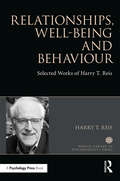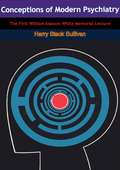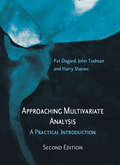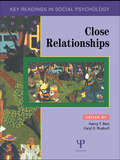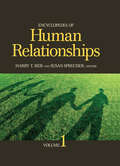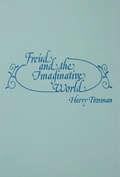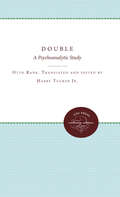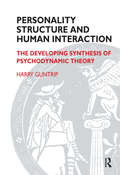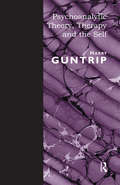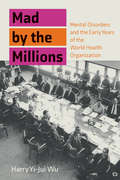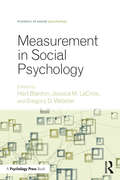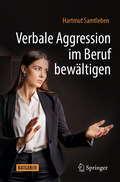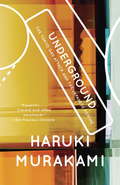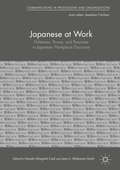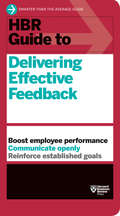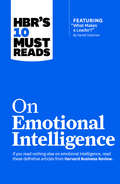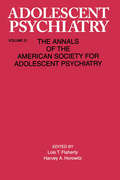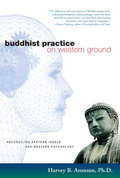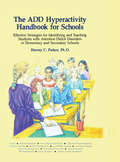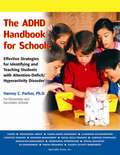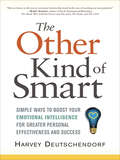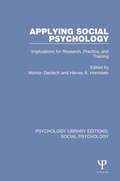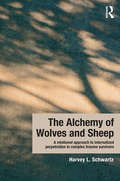- Table View
- List View
Relationships, Well-Being and Behaviour: Selected works of Harry Reis (World Library of Psychologists)
by Harry ReisIn the World Library of Psychologists series, international experts themselves present career-long collections of what they judge to be their finest pieces - extracts from books, key articles, salient research findings, and their major practical theoretical contributions. In this fascinating volume, Harry Reis reflects on a career that has earned him an international reputation as an eminent scholar and pioneer in the field of relationship science, through a selection of papers that illustrate the foundational theme of his research career: the importance of relationships for human well-being. The book charts the development of research in social psychology and relationship science through three key themes; from the relationship context of human behaviour, through to the value of studying behaviour in its natural context, and finally intimacy and responsiveness in close relationships. Also featuring a newly written introduction by the author contextualizing the selections and offering an intimate overview of his career, this collection of key publications offers a unique and compelling insight into decades of groundbreaking work, making it an essential resource for all those engaged or interested in the psychology of relationships and well-being.
Conceptions of Modern Psychiatry: The First William Alanson White Memorial Lecture
by Harry Stack SullivanThe central ideas making up Harry Stack Sullivan’s theory of personality find their first expression in this book. Here he set forth his view of psychiatry as the study of interpersonal relations. “Psychiatry,” he wrote, “is the study of processes that involve or go on between people. The field of psychiatry is the field of interpersonal relations under any and all circumstances in which these relations exist. A personality can never be isolated from the complex of interpersonal relations in which the person lives and has his being.”Through his development of the theory of interpersonal relations, Harry Stack Sullivan not only made a vital contribution on the treatment of mental disorder—in particular, schizophrenia—but he opened an entirely new approach to the study of human personality. “The core of Sullivan’s theory,” says Lloyd Frankenberg in the New York Times, “is that people, interacting, shape people….He has evolved an analytic method, for all its subtlety and elaboration, wonderfully coherent, organic and usable.”The influence of Harry Stack Sullivan has had a powerful impact. He has been called one of the half dozen truly great figures in American social psychology, one who has opened new horizons of research and, in the view of many analysist, made the most original contribution to psychiatry since Freud.
Approaching Multivariate Analysis, 2nd Edition: A Practical Introduction
by John Todman Pat Dugard Harry StainesThis fully updated new edition not only provides an introduction to a range of advanced statistical techniques that are used in psychology, but has been expanded to include new chapters describing methods and examples of particular interest to medical researchers. It takes a very practical approach, aimed at enabling readers to begin using the methods to tackle their own problems. This book provides a non-mathematical introduction to multivariate methods, with an emphasis on helping the reader gain an intuitive understanding of what each method is for, what it does and how it does it. The first chapter briefly reviews the main concepts of univariate and bivariate methods and provides an overview of the multivariate methods that will be discussed, bringing out the relationships among them, and summarising how to recognise what types of problem each of them may be appropriate for tackling. In the remaining chapters, introductions to the methods and important conceptual points are followed by the presentation of typical applications from psychology and medicine, using examples with fabricated data. Instructions on how to do the analyses and how to make sense of the results are fully illustrated with dialogue boxes and output tables from SPSS, as well as details of how to interpret and report the output, and extracts of SPSS syntax and code from relevant SAS procedures. This book gets students started, and prepares them to approach more comprehensive treatments with confidence. This makes it an ideal text for psychology students, medical students and students or academics in any discipline that uses multivariate methods.
Close Relationships: Key Readings (Key Readings in Social Psychology)
by Harry T. ReisEach of the chapters in this reader is written by leading scholars in the area of relationships, reflecting the diversity of the field and including both contemporary and key historical papers for comprehensive coverage of research.
Encyclopedia of Human Relationships
by Harry T. Reis Susan SprecherLibrary Journal Best Reference 2009"An excellent gateway to further examination of any of the subdisciplines of relationship science, or as a research tool in its own right." —Library JournalRelationships are fundamental to nearly all domains of human activity, from birth to death. When people participate in healthy, satisfying relationships, they live, work, and learn more effectively. When relationships are distressed or dysfunctional, people are less happy, less healthy, and less productive. Few aspects of human experience have as broad or as deep effects on our lives.The Encyclopedia of Human Relationships offers an interdisciplinary view of all types of human associations—friends, lovers, spouses, roommates, coworkers, teammates, parents and children, cousins, siblings, acquaintances, neighbors, business associates, and so forth. Although each of these connections is unique in some respect, they share a common core of principles and processes. These three volumes provide a state-of-the-art review of the extensive theories, concepts, and empirical findings about human relationships.Key FeaturesCompiles leading-edge information about how people think, feel, and act toward each otherPresents the best in the field—authors who have contributed significant scientific knowledge about personal relationships over the past several decades.Offers a diverse approach to relationship science with contributions from psychology, sociology, communication, family studies, anthropology, physiology, neuroscience, history, economics, and legal studiesKey Themes:Cognitive Processes in RelationshipsCommunication ProcessesCreating and Maintaining ClosenessDating, Courtship, and MarriageThe Dark Side of RelationshipsEmotion Processes in RelationshipsFamilyFriendship and Caregiving in AdulthoodHealth and the Biology of RelationshipsMethods for Studying RelationshipsPersonality and Individual DifferencesPrevention and Repair of Relationship ProblemsPsychological ProcessesSexualitySocial Context of RelationshipsSocial Relations in Childhood and AdolescenceTheoretical Approaches to Studying RelationshipsTypes of RelationshipsOur relationships influence virtually all aspects of our everyday existence and are of deep interest to students, researchers, academics, and laypeople alike. This Encyclopedia is an invaluable addition to any academic or public library.
Freud and the Imaginative World
by Harry TrosmanThe current resurgence of interest in the scientific origins of psychoanalysis has overshadowed the artistic and literary models to which Freud had recourse time and again in the development and presentation of his theories. It is this neglected aesthetic wellspring of psychoanalysis to which Harry Trosman calls attention in Freud and the Imaginative World. Trosman enriches our understanding of psychoanalysis by demonstrating how Freud's cultural and humanistic commitments guided his pursuit of a science of mind. Toward this end, he undertakes a number of challenging tasks: to situate Freud in the formative culture of his time, to adumbrate the human concerns that infromed his work in the natural sciences, and to delineate the multiple "modes of influence" that fostered his creativity. The second part of the book moves from the cultural sources of Freud's creativity to the psychoanalytic contribution to our understanding of art and literature. Here, Trosman focuses on the consumer of art and literature, tracing psychoanalytic perspectives on aesthetic responsiveness from Freud to the present. Trosman's critical review of the da Vinci and Hamlet literature illustrates the limitations as well as the explanatory potential of the two principal genres of applied psychoanalytic work, and leads naturally to the reflective estimation of psychoanalysis and creativity that concludes the work. Throughout, Trosman is a well-informed and engaging guide, both to the imaginative Freud and to the abundant literature on psychoanalysis and the arts. He documents Freud's continuing indebtedness to the literary models that nourished his theorizing and gave shape to his narrative clinical expositions, even as he takes pains to show how psychoanalysis has, in many ways, outgrown Freud's own reductive explanations of aesthetic phenomena. A skillfully crafted overview, Freud and the Imaginative World is an exemplary introduction to a crucial aspect of the Freudian legacy.
The Double: A Psychoanalytic Study
by Harry Tucker Otto RankAlive, fresh, and stimulating, the theme of The Double comprises the issues of identity, narcissism, and the fear of death--actually the core of human existence. Rank's book is primarily a study of the double as it appeared in striking examples in German, French, Russian, English, and American literature from Goethe to Oscar Wilde.Originally published in 1971.A UNC Press Enduring Edition -- UNC Press Enduring Editions use the latest in digital technology to make available again books from our distinguished backlist that were previously out of print. These editions are published unaltered from the original, and are presented in affordable paperback formats, bringing readers both historical and cultural value.
Personality Structure and Human Interaction: The Developing Synthesis of Psychodynamic Theory
by Harry Y. GuntripHow has a theory of man as a social being to be formulated if we are to do justice to his individuality, to the subtle ways in which his love and hate compete within his relations with others and to the anxieties and resistances he shows when he seeks to change himself? To answer this question is the task which the author sets himself. After assessing Freud's basic principles, the author proceeds to make a uniquely comprehensive review of subsequent theoretical contributions to psychoanalysis with special emphasis on the work of Fairbairn and Melanie Klein. From a background of philosophy, theology and social studies, the author went on to take a personal psychoanalysis and to become a full time psychotherapist, and it is from this combination of wide knowledge and intensive work with people beset by conflicts in their relations with themselves and others that he evolves his views.
Psychoanalytic Theory, Therapy and the Self
by Harry Y. GuntripPsychoanalytic Theory, Therapy and the Self presents, in a readily accessible form, the overall theoretical position adopted by the author in his two earlier books Personality Structure and Human Interaction (1961) and Schizoid Phenomena, Object Relations and the Self (1968). Part One, addressing itself to theoretical issues in psychoanalysis, traces the changes which have occurred in psychodynamic thought since Freud's early conjectures, reflecting the physicality mode of scientific thought in which he had been trained and typified by the theory of instincts have been largely modified or superseded by the contributions of object-relations theory. Part Two, based on a series of seminars devoted to the structure and treatment of the schizoid personality, puts the theoretical issues discussed in Part One into perspective of therapeutic practice.
Mad by the Millions: Mental Disorders and the Early Years of the World Health Organization (Culture and Psychiatry)
by Harry Yi-Jui WuThe World Health Organization's post-World War II work on the epidemiology and classification of mental disorders and its vision of a "world psyche."In 1946, the World Health Organization undertook a project in social psychiatry that aimed to discover the epidemiology and classification of mental disorders. In Mad by the Millions, Harry Y-Jui Wu examines the WHO's ambitious project, arguing that it was shaped by the postwar faith in technology and expertise and the universalizing vision of a "world psyche." Wu shows that the WHO's idealized scientific internationalism laid the foundations of today's highly highly metricalized global mental health system.
Measurement in Social Psychology (Frontiers of Social Psychology)
by Hart Blanton LaCroix Jessica M. Webster Gregory D.Although best known for experimental methods, social psychology also has a strong tradition of measurement. This volume seeks to highlight this tradition by introducing readers to measurement strategies that help drive social psychological research and theory development. The books opens with an analysis of the measurement technique that dominates most of the social sciences, self-report. Chapter 1 presents a conceptual framework for interpreting the data generated from self-report, which it uses to provide practical advice on writing strong and structured self-report items. From there, attention is drawn to the many other innovative measurement and data-collection techniques that have helped expand the range of theories social psychologists test. Chapters 2 through 6 introduce techniques designed to measure the internal psychological states of individual respondents, with strategies that can stand alone or complement anything obtained via self-report. Included are chapters on implicit, elicitation, and diary approaches to collecting response data from participants, as well as neurological and psychobiological approaches to inferring underlying mechanisms. The remaining chapters introduce creative data-collection techniques, focusing particular attention on the rich forms of data humans often leave behind. Included are chapters on textual analysis, archival analysis, geocoding, and social media harvesting. The many methods covered in this book complement one another, such that the full volume provides researchers with a powerful toolset to help them better explore what is "social" about human behavior.
Verbale Aggression im Beruf bewältigen
by Hartmut SamtlebenDieser Ratgeber ermutigt und befähigt Menschen, auf eine verbale Attacke souverän zu reagieren und mit einer strukturierten Methode eine Konfrontation in Kollaboration zu verwandeln – realistisch, wirksam und direkt umsetzbar. Verbale Aggression tritt durch die hohe Dynamik im Beruf immer häufiger auf. Jeder ist davon betroffen, und die wenigsten können konstruktiv darauf reagieren. Das Buch vermittelt mit einer Fülle an Beispielen, welche Formen die oft verschleierte verbale Aggression annimmt und welche physiologischen Reaktionen und psychologischen Abläufe eine Rolle spielen. Es liefert konkrete Techniken, um sich zu fangen und ein Gespräch zu kontrollieren, und bietet ein strukturiertes Vorgehen, um einen Angriff zu begrenzen und in ein konstruktives Miteinander umzuwandeln. Dazu gibt es eine konkrete Anleitung, um diese Kompetenz zu vertiefen. So gewinnen Sie Souveränität und Sicherheit, um verbale Aggression im Beruf zu bewältigen und zu einem positiven Ergebnis zu führen. Die Zielgruppen Alle berufstätigen Menschen, insbesondere Führungskräfte, HR-Mitarbeiter, Moderatoren und Coaches.
Kiku: The Japanese Art of Good Listening
by Haru YamadaListening connects us to others and the world around us. Learn how to harness its power in this life-changing new book.Drawing on the Japanese concept of 'kiku', sociolinguist and listening expert Haru Yamada shares a transformational guide to becoming better listeners in our daily life. Kiku is a particular type of listening that goes beyond the superficial. It is a deep listening that brings us together.Kiku offers a brand-new insight into the art of listening and an informative roadmap to help you to listen with intention and meaning in your daily interactions. Once you understand how hearing and listening work, you'll start noticing your own. You will gain a deeper understanding of the world. You'll read rooms better because you'll be reading more deeply between the lines of the people around you. Kiku is an essential guide to unlocking the power of listening in your relationships, at work and at home, and in the wider world around you.
Kiku: The Japanese Art of Good Listening
by Haru YamadaListening connects us to others and the world around us. Learn how to harness its power in this life-changing new book.Drawing on the Japanese concept of 'kiku', sociolinguist and listening expert Haru Yamada shares a transformational guide to becoming better listeners in our daily life. Kiku is a particular type of listening that goes beyond the superficial. It is a deep listening that brings us together.Kiku offers a brand-new insight into the art of listening and an informative roadmap to help you to listen with intention and meaning in your daily interactions. Once you understand how hearing and listening work, you'll start noticing your own. You will gain a deeper understanding of the world. You'll read rooms better because you'll be reading more deeply between the lines of the people around you. Kiku is an essential guide to unlocking the power of listening in your relationships, at work and at home, and in the wider world around you.
Underground: The Tokyo Gas Attack and the Japanese Psyche (Vintage International)
by Haruki MurakamiIn this haunting work of journalistic investigation, Haruki Murakami tells the story of the horrific terrorist attack on Japanese soil that shook the entire world. On a clear spring day in 1995, five members of a religious cult unleashed poison gas on the Tokyo subway system. In attempt to discover why, Haruki Murakmi talks to the people who lived through the catastrophe, and in so doing lays bare the Japanese psyche. As he discerns the fundamental issues that led to the attack, Murakami paints a clear vision of an event that could occur anytime, anywhere.
Japanese at Work: Politeness, Power, And Personae In Japanese Workplace Discourse (Communicating In Professions And Organizations Ser.)
by Haruko Minegishi Cook Janet S. Shibamoto-SmithThis book empirically explores how different linguistic resources are utilized to achieve appropriate workplace role inhabitance and to achieve work-oriented communicative ends in a variety of workplaces in Japan. Appropriate role inhabitance is seen to include considerations of gender and interpersonal familiarity, along with speaker orientation to normative structures for marking power and politeness. This uniquely researched edited collection will appeal to scholars of workplace discourse and Japanese sociolinguistics, as well as Japanese language instructors and adult learners of Japanese. It is sure to make a major contribution to the cross-linguistic/cultural study of workplace discourse in the globalized context of the twenty-first century.
HBR Guide to Delivering Effective Feedback (HBR Guide Series)
by Harvard Business ReviewTake the stress out of giving feedback.To help your employees meet their goals and fulfill their potential, you need to provide them with regular feedback. But the prospect of sharing potentially negative news can be overwhelming. How do you construct your message so that it's not only well received but also expressed in a way that encourages change?Whether you're commending exemplary work or addressing problem behavior, the HBR Guide to Delivering Effective Feedback provides you with practical advice and tips to transform any performance discussion-from weekly check-ins to annual reviews-into an opportunity for growth and development. You'll learn to: Establish trust with your direct reports Assess their performance fairly Emphasize improvement, even in criticism React calmly to a defensive feedback recipient Recognize and motivate star performers Create individualized development plansArm yourself with the advice you need to succeed on the job, from a source you trust. Packed with how-to essentials from leading experts, the HBR Guides provide smart answers to your most pressing work challenges.
HBR's 10 Must Reads on Emotional Intelligence (with featured article "What Makes a Leader?" by Daniel Goleman)
by Harvard Business ReviewIn his defining work on emotional intelligence, bestselling author Daniel Goleman found that it is twice as important as other competencies in determining outstanding leadership.If you read nothing else on emotional intelligence, read these 10 articles by experts in the field. We've combed through hundreds of articles in the Harvard Business Review archive and selected the most important ones to help you boost your emotional skills-and your professional success.This book will inspire you to: Monitor and channel your moods and emotions Make smart, empathetic people decisions Manage conflict and regulate emotions within your team React to tough situations with resilience Better understand your strengths, weaknesses, needs, values, and goals Develop emotional agility
Adolescent Psychiatry, V. 21: Annals of the American Society for Adolescent Psychiatry
by Lois T. Flaherty Harvey A. HorowitzLaunched in 1971, Adolescent Psychiatry, in the words of founding coeditors Sherman C. Feinstein, Peter L. Giovacchini, and Arthur A. Miller, promised "to explore adolescence as a process . . . to enter challenging and exciting areas that may have profound effects on our basic concepts." Further, they promised a "series that will provide a forum for the expression of ideas and problems that plague and excite so many of us working in this enigmatic but fascinating field." For over two decades, Adolescent Psychiatry has fulfilled this promise. The repository of a wealth of original studies by preeminent clinicians, developmental researchers, and social scientists specializing in this stage of life, the series has become an essential resource for all mental health practitioners working with youth. Volume 21 honors the memory of Richard C. Marohn, former editor of Adolescent Psychiatry, and Herman D. Staples, founding member of the American Society for Adolescent Psychiatry. It begins with a section of papers that ranges over important aspects of "Development and Psychopathology." Topics explored by the contributors include: adolescents and authority; adolescents and disaster; adolescent awareness of the past; adolescent daughters of divorce; parent loss; adolescent schizophrenia; and adolescent mood disorders. Sections on "Assessment," "Issues in Psychotherapy," and "Training" round out a balanced survey of the field that is true to the spirit of this distinguished series. Volume 21 will be rewarding reading for child and adolescent therapists and all students of early development.
Buddhist Practice on Western Ground: Reconciling Eastern Ideals and Western Psychology
by Harvey Aronson"This is the first book to offer Buddhist meditators a comprehensive and sympathetic examination of the differences between Asian and Western cultural and spiritual values. Harvey B. Aronson presents a constructive and practical assessment of common conflicts experienced by Westerners who look to Eastern spiritual traditions for guidance and support--and find themselves confused or disappointed. Issues addressed include: *
The ADD Hyperactivity Handbook For Schools
by Harvey C. ParkerIf you've ever wanted to take dynamic and vibrant digital photos of your favorite band in concert, but aren't sure how to tackle such obstacles as approaching the stage, tricky lighting situations, or even what equipment to use, then look no further!Concert and Live Music Photographyis a comprehensive guide to shooting live music performances, providing you with the right information on equipment, camera settings, composition, and post-processing to get the best out of each performance shot. J. Dennis Thomas, whose work has appeared in such magazines as Rolling Stone, SPIN, and Country Weekly, shares tips on lighting, common problems, etiquette, and recommended camera settings for shooting in a variety of different venues, including clubs, bars, outdoor concerts, theatres, stadiums, and arenas. He also explains how to get the right credentials to get you closer to each performance.Jam packed with over160 photos from today's top concerts, this book will not only give you the information you need to start taking rockin' photos of your favorite musicians, but will spark your creativity when you're anticipating the next shot.For the on-the-go photographer, a cool companion website features additional tips, venue troubleshooting, and an equipment checklist when you need to think on your feet while running to another gig.
The ADHD Handbook for Schools: Effective Strategies for Identifying and Teaching Students with Attention-Deficit/Hyperactivity Disorder
by Harvey C. ParkerEducators in regular and special education settings who teach students with ADHD will appreciate this classroom-focused guide to ADHD that discusses specific teaching strategies and provides a thorough history of the disorder. The most up-to-date knowledge about ADHD characteristics, diagnosis, contributing factors, and medical and psychosocial treatments is comprehensively detailed. Suggested teaching techniques and tips for improving learning and behavior in the classroom include strategies for developing partnerships with parents of ADHD students, a listing of support groups and resources for parents, and specific tools for assessment, such as rating scales and history forms.
The Other Kind of Smart: Simple Ways to Boost Your Emotional Intelligence for Greater Personal Effectiveness and Success
by Harvey DeutschendorfEmotional intelligence (EI) coach Harvey Deutschendorf combines his proven techniques with engaging principles of storytelling and fun exercises to show you how you can apply the principles of EI on the job to achieve greater success.Filled with real-life profiles of people who faced emotional intelligence dilemmas and easy-to-implement solutions, Other Kind of Smart offers tools that will bring results in as little as five minutes a day and teaches you how to:develop stress tolerance, cultivate empathy, increase flexibility with coworkers, boost assertiveness, and resolve problems successfully.The difference between those who become successful in life and those who struggle is their ability to exhibit and leverage strong people skills. Complete with an EI quiz that will help you measure their level of emotional intelligence and EI growth, Other Kind of Smart enables all professionals to improve their relationships and increase their effectiveness at work in a practical, accessible way.
Applying Social Psychology: Implications for Research, Practice, and Training (Psychology Library Editions: Social Psychology)
by Morton Deutsch Harvey HornsteinOriginally published in 1975, these contributions surveyed the range of social intervention technology available to psychologists at the time, but they are more than a simple cataloguing of technology. The stress is on articulating certain metatheoretical assumptions that underlie different strategies of social intervention. For example, assumptions about the personal agency, the nature of social systems, and levels and forms of interpersonal influences are all examined. The implications for the training of psychologists are developed, and specific attention is given to the identity crisis in social psychology precipitated by existing pressures and potentials for change at the time.
The Alchemy of Wolves and Sheep: A Relational Approach To Internalized Perpetration In Complex Trauma Survivors
by Harvey L. SchwartzThe literature on psychological trauma and traumatic attachment has progressed over the past few decades, however issues of coerced and internalized perpetration have not been fully explored and deconstructed. This book presents a synthesis of relational and archetypal psychology, trauma and dissociation theory, and highly relevant child soldier literature, to offer new clinical perspectives to assist psychotherapists and trauma patients to achieve more successful therapy outcomes. The Alchemy of Wolves and Sheep offers instructive, cautionary and innovative therapeutic approaches to help transform the lives of survivors of complex trauma. Providing an explanation of how the effects of coerced perpetration trauma are built, and the damage done to the psyches and lives of most trauma victims, the book extends our knowledge base in a thorough deconstruction of the nature of perpetration and its effects on the psyche. Chapters include: - trauma, dissociation, and coerced perpetration - the child soldier as a model of internalized perpetration - relational concepts in the treatment of trauma and dissociative disorders - treatment trajectory - archetypal constructs as a vehicle for integration. This book provides valuable new perspectives on the psychodynamic challenges and opportunities for mental health professionals treating internalized perpetration in survivors of complex trauma, and will prove essential reading for psychotherapists, psychoanalysts and post-graduate students as well as researchers, legal scholars and policy makers.
